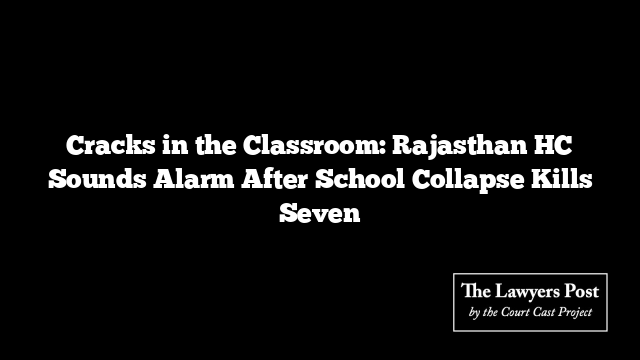In the wake of a harrowing tragedy in Banswara district—where a government school’s classroom ceiling and wall collapsed, killing seven children and severely injuring others—the Rajasthan High Court has stepped in with firm resolve and unflinching urgency.
Acting on its own motion, the Court has launched a wide-ranging inquiry into the state of school infrastructure, calling the incident not just a failure of cement and brick, but of systemic apathy. The courtroom, led by Justice Anoop Kumar Dhand, transformed into a forum of reckoning, where the judiciary laid bare the crumbling state of educational facilities across the state—and, by extension, the nation.
“Efforts may have been made, but the rot runs deep,” Justice Dhand observed sharply, noting that the Government’s strides in education have stumbled at the threshold of basic safety. He stressed that access to education cannot exist in a vacuum devoid of structural integrity, electricity, clean water, or dignity.
The collapse occurred at the Government Upper Primary School in Village Piplodi. Among the deceased were two siblings. For those who survived, the fight is now in hospital wards—some still battling grave injuries.
The Court cited disturbing data from the National Commission for Protection of Child Rights (NCPCR): nearly one in four school buildings surveyed in 12 states was found structurally unsound. Cracks, literally and figuratively, run through the nation’s classrooms. Nearly a third of schools lack electricity. Sanitary pad access is nearly nonexistent. Libraries are more myth than material. And inclusivity—whether for students with disabilities or for girls navigating adolescence without menstrual hygiene support—remains an unrealized promise.
Justice Dhand didn’t spare private schools either. Over 40,000 were penalized for failing to meet even the most basic infrastructure standards. Sports and physical education? Marginalized to the point of invisibility, with most schools lacking equipment, schedules, or even encouragement for physical development.
The judgment invoked Article 21-A of the Constitution—the right to free and compulsory education—arguing that such a right is meaningless if schools themselves are unsafe or unfit for learning.
Among the directives issued:
- Immediate safety audits across all government and private schools
- Compensation and medical care for the Banswara victims
- Installation of sanitary pad vending machines
- Formation of district-level monitoring committees
- Establishment of grievance redressal platforms
- Accountability measures for negligent officials
- Universal access to toilets, clean drinking water, electricity, libraries, and accessible facilities for disabled students
The message from the bench was unmistakable: a safe school is not a luxury—it is a constitutional necessity. And if the state fails to meet that bar, the judiciary will not look the other way.
The matter is set to return to court on August 1, with the Union and State governments ordered to file compliance reports by then. Rajasthan, the land of kings, now faces a test not of heritage, but of conscience.




